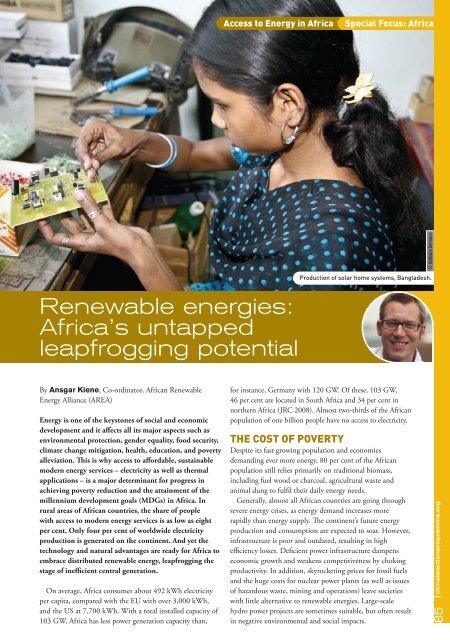Climate Action 2011-2012
You also want an ePaper? Increase the reach of your titles
YUMPU automatically turns print PDFs into web optimized ePapers that Google loves.
Access to energy in Africa<br />
special focus: Africa<br />
© Nathalie Bertrams<br />
Renewable energies:<br />
Africa’s untapped<br />
leapfrogging potential<br />
Production of solar home systems, Bangladesh.<br />
By Ansgar Kiene, Co-ordinator, African Renewable<br />
Energy Alliance (AREA)<br />
Energy is one of the keystones of social and economic<br />
development and it affects all its major aspects such as<br />
environmental protection, gender equality, food security,<br />
climate change mitigation, health, education, and poverty<br />
alleviation. This is why access to affordable, sustainable<br />
modern energy services – electricity as well as thermal<br />
applications – is a major determinant for progress in<br />
achieving poverty reduction and the attainment of the<br />
millennium development goals (MDGs) in Africa. In<br />
rural areas of African countries, the share of people<br />
with access to modern energy services is as low as eight<br />
per cent. Only four per cent of worldwide electricity<br />
production is generated on the continent. And yet the<br />
technology and natural advantages are ready for Africa to<br />
embrace distributed renewable energy, leapfrogging the<br />
stage of inefficient central generation.<br />
On average, Africa consumes about 492 kWh electricity<br />
per capita, compared with the EU with over 3,000 kWh,<br />
and the US at 7,700 kWh. With a total installed capacity of<br />
103 GW, Africa has less power generation capacity than,<br />
for instance, Germany with 120 GW. Of these, 103 GW,<br />
46 per cent are located in South Africa and 34 per cent in<br />
northern Africa (JRC 2008). Almost two-thirds of the African<br />
population of one billion people have no access to electricity.<br />
The cosT of poverTy<br />
Despite its fast growing population and economies<br />
demanding ever more energy, 80 per cent of the African<br />
population still relies primarily on traditional biomass,<br />
including fuel wood or charcoal, agricultural waste and<br />
animal dung to fulfil their daily energy needs.<br />
Generally, almost all African countries are going through<br />
severe energy crises, as energy demand increases more<br />
rapidly than energy supply. The continent’s future energy<br />
production and consumption are expected to soar. However,<br />
infrastructure is poor and outdated, resulting in high<br />
efficiency losses. Deficient power infrastructure dampens<br />
economic growth and weakens competitiveness by choking<br />
productivity. In addition, skyrocketing prices for fossil fuels<br />
and the huge costs for nuclear power plants (as well as issues<br />
of hazardous waste, mining and operations) leave societies<br />
with little alternative to renewable energies. Large-scale<br />
hydro power projects are sometimes suitable, but often result<br />
in negative environmental and social impacts.<br />
85 climateactionprogramme.org












